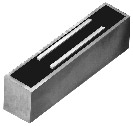
Magnets are available in different shapes. Some of them are cylindrical. Known as disc magnets, cylindrical magnets are compact yet powerful. There are also rectangular magnets. Rectangular magnets are available in different materials, such as ceramic and neodymium. They are distinguished from other types of magnets, however, by their rectangular shape. Here are six common uses for rectangular magnets.
#1) Workholding
Rectangular magnets are used in workholding applications. Like other magnets, they produce a magnetic field that attracts ferromagnetic metals. Objects made of iron, steel, nickel or similar ferromagnetic metals will be attracted to rectangular magnets. Therefore, if you’re working on objects made of these materials, you can use rectangular magnets to hold them in place. Some rectangular magnets even come with precut holes so that you can mount them in place.
#2) Recycling
Recycling facilities often use rectangular magnets. They allow recycling facilities to quickly and effortlessly separate ferrous metals from other materials. Rectangular magnets can be mounted over conveyor belts. As the conveyor belts move materials, the magnets will pull out ferrous metals for recycling.
#3) Magnetic Catches
Rectangular magnets make the perfect magnetic catches. Magnetic catches are designed to keep cabinets, drawers and panels closed. They typically consist of a two-piece magnetic assembly: a magnet and a ferromagnetic block. The magnet is mounted to the back of the cabinet door, whereas the ferromagnetic block is mounted to the cabinet itself. Most magnetic catches such as this consist of rectangular magnets.
#4) Retail Displays
Many retailers use rectangular magnets. With their rectangular shape, they can easily hold signs, price tags and promotional displays. Furthermore, rectangular magnets allow retailers to swap out these items. They can pull down old signs held with a rectangular magnet and quickly replace them with new signs.
#5) Door Locks
Rectangular magnets are commonly used for door locks. Magnetic door locks work by leveraging an electric current. They aren’t permanent magnets. Rather, they are electromagnets that require an electric current to produce a magnetic field. Magnetic door locks feature an electromagnet that holds a door shut by pulling the door to an adjacent metal plate.
#6) Electronics
Rectangular magnets are found in many electronics. Speakers, for instance, feature magnets to create vibrations within the cone, which is essential to producing sound. Computer hard drives also feature magnets to read and write data. While the shape of these magnets may vary, many electronics use rectangular magnets.
